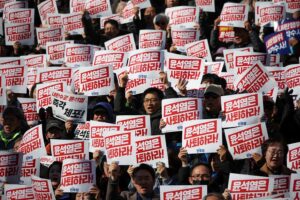South Korean President Under Fire Amid Martial Law Controversy

South Korea’s political landscape has been shaken by intense calls for the impeachment of its president following a controversial debacle surrounding the proposal of martial law. This issue has reignited debates about democratic accountability and the limits of executive power in one of Asia’s most advanced democracies. The controversy stems from reports that the president’s administration considered implementing martial law to suppress dissent, raising serious concerns about the erosion of democratic principles.
The crisis began when leaked documents suggested that the government had drawn plans for martial law to quell widespread protests against the administration. Critics have decried this move as an authoritarian overreach, reminiscent of South Korea’s tumultuous past under military dictatorships. While the president has denied any intention of executing the plan, opposition parties and civil rights groups argue that even contemplating such measures is an affront to the country’s hard-earned democratic values.
Public outrage has been palpable, with protests erupting in major cities demanding transparency and accountability. South Korean citizens, who have historically played a pivotal role in defending democracy, have taken to the streets to voice their dissatisfaction. Many see the debacle as a betrayal of the trust placed in the government, emphasizing the need for systemic reforms to prevent the abuse of power.
Calls for impeachment are growing louder, with opposition lawmakers pushing for a thorough investigation into the matter. Analysts suggest that this could lead to a political standoff, as the president’s party remains divided over whether to support the impeachment. The unfolding scenario poses a significant challenge to South Korea’s political stability, potentially affecting its economy and foreign policy.
As South Korea grapples with this crisis, the situation serves as a stark reminder of the delicate balance between governance and the protection of democratic freedoms. Whether this debacle leads to impeachment or sparks deeper reforms, it underscores the importance of vigilance in safeguarding democracy in the face of challenges.


